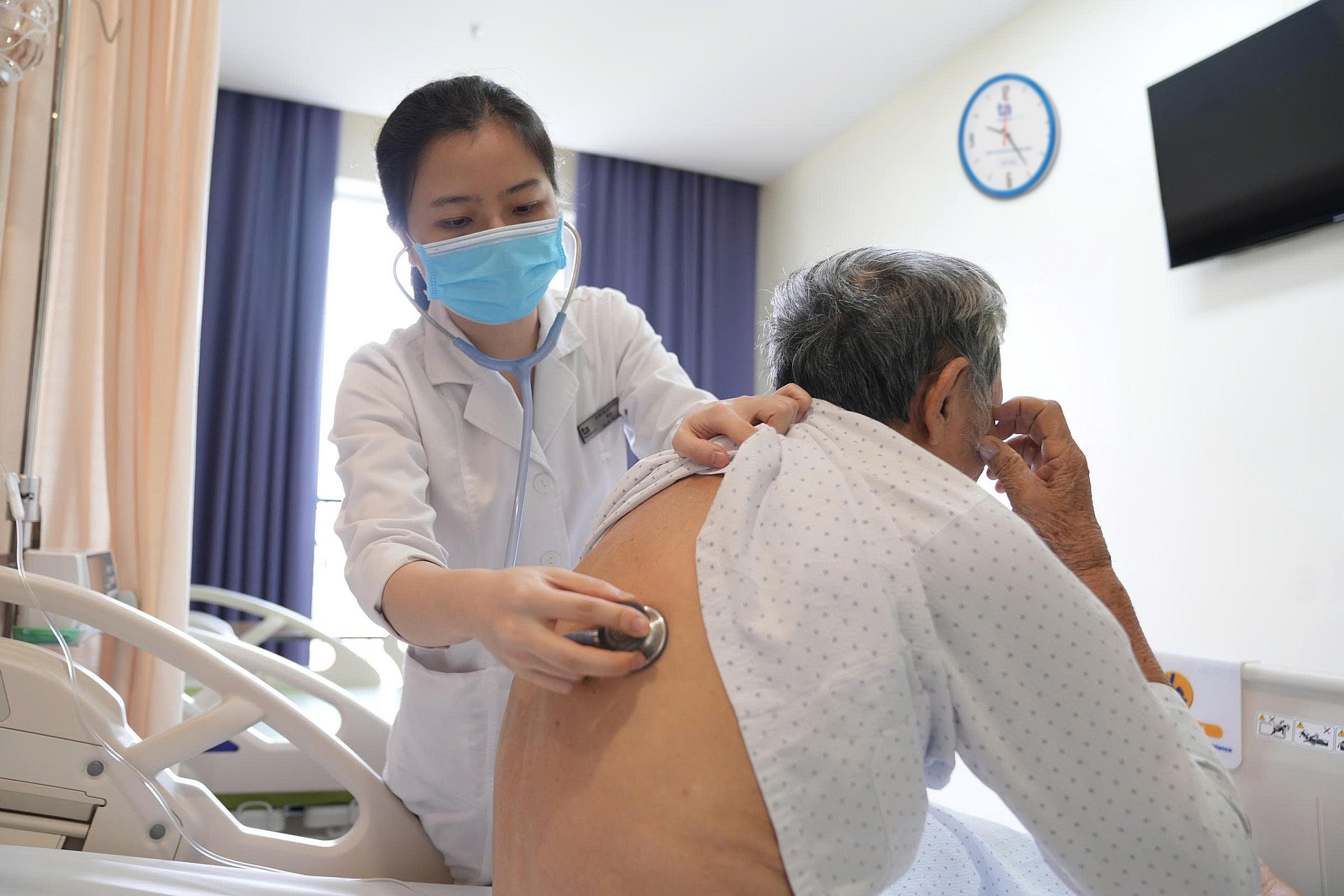Dr. Nguyen Thi Thuy Hau, from the Department of Internal Medicine at Tam Anh General Hospital in Hanoi, explains how to differentiate between the two illnesses.
Causes
Viral fever can be caused by various viruses, including rhinovirus, adenovirus, enterovirus, and respiratory syncytial virus. These illnesses can spread through respiratory or digestive routes, or contact with an infected person's secretions. Viral fevers are common during seasonal changes when fluctuating weather conditions promote the growth of these pathogens. Individuals with weakened immune systems, such as children, the elderly, and those with underlying health conditions, are more susceptible.
Dengue fever is caused by the dengue virus and is transmitted through the bite of the Aedes aegypti or Aedes albopictus mosquitoes. It affects people of all ages and typically outbreaks during the rainy season, from July to November, when warm, humid weather creates ideal breeding conditions for these mosquitoes.
Symptoms
Both illnesses initially present with fever as the immune system responds to the virus. Dengue fever progresses through distinct stages. In the initial phase (the first 3 days), patients typically experience a sudden high fever of 39-40°C, accompanied by headaches, fatigue, eye pain, sore throat, cough, and runny nose.
In the next stage, the fever gradually subsides. Patients may develop a skin rash, small red spots that don't disappear when the skin is stretched, nosebleeds, bleeding gums, or abnormal menstrual bleeding in women. Some experience gastrointestinal bleeding (black, bloody stools, vomiting blood) or more severe complications like intracranial hemorrhage, abdominal bleeding, hypotension, and shock, which can be life-threatening. During the recovery phase, the fever subsides, platelet counts return to normal, and the patient's condition gradually improves.
Viral fever symptoms vary depending on the specific virus. Patients often experience a high fever of 39-40°C, fatigue, body aches, lethargy, sore throat, cough, runny nose, and digestive issues like bloating, diarrhea, vomiting, and nausea. Swollen lymph nodes in the head and neck, eye pain, headaches, and a mild rash may also occur. These red spots disappear when the skin is stretched. Young children may be fussy and are at risk of seizures if the high fever is not controlled. Viral fever symptoms usually subside within 5-7 days.
Complications
Most fevers resolve within a few days with proper monitoring and care. However, Dr. Hau warns that both dengue fever and viral fevers can lead to dangerous complications if left untreated. Dengue can cause shock due to blood loss, hypotension, severe headaches, pleural effusion, or plasma leakage leading to cerebral edema and coma. Other serious complications include heart failure, kidney failure, or retinal and vitreous hemorrhage, increasing the risk of blindness. Pregnant women with severe dengue are at risk of miscarriage.
Viral fever usually runs a mild course and resolves on its own within 7-10 days. However, without proper care, bacterial infections can develop, leading to complications such as pneumonia, bronchiolitis, laryngitis, myocarditis, and brain damage.
 |
A doctor from the Department of Internal Medicine examines a patient. Photo: Tam Anh General Hospital |
A doctor from the Department of Internal Medicine examines a patient. Photo: Tam Anh General Hospital
Diagnosis
Differentiating between the two fevers involves clinical evaluation and blood tests. In viral fever, blood tests typically show a slightly decreased or normal white blood cell count, a slight decrease in platelets, and a possible slight increase in C-reactive protein (CRP), which measures inflammation. Dengue fever, however, presents with a rapid decrease in both platelets and white blood cells, and an increase in hematocrit (the proportion of red blood cells in the blood) due to blood thickening. Dengue diagnostic tests include the NS1 antigen test, which is positive in the first 5 days, and the IgM antibody test, which becomes positive from the 5th day onwards.
Treatment
Currently, there are no specific antiviral medications for either viral fever or dengue fever. Viral fever is usually mild and resolves with proper care after the fever subsides. Dengue fever, however, requires close monitoring from the 3rd day onwards, as this is when the fever starts to decrease but the risk of severe complications increases due to rapidly dropping platelet counts and blood thickening. Patients need regular monitoring of platelet counts and hematocrit, along with appropriate fluid and electrolyte replacement. Paracetamol is the recommended fever reducer, as aspirin and ibuprofen can increase the risk of bleeding.
According to Dr. Hau, antibiotics are ineffective against both illnesses and should not be used. Patients should rest, drink plenty of fluids, and eat nutritious, easily digestible foods to promote recovery. Hospitalization is necessary for viral fever that doesn't improve after 3-4 days or presents with signs of bacterial infection such as a cough with yellow-green phlegm, persistent sore throat, or prolonged diarrhea. Warning signs of severe dengue fever include high fever unresponsive to antipyretics, nosebleeds, bleeding gums, frequent vomiting, severe abdominal pain in the right upper quadrant, cold hands and feet, decreased urination, skin hemorrhages, platelet counts below 50,000/mm³, increased hematocrit, and lethargy or refusal to feed in children. These signs indicate a high risk of dengue shock syndrome.
To prevent these illnesses, Dr. Hau recommends vaccination. A dengue vaccine is available for individuals 4 years and older, protecting against all 4 dengue virus strains. Mosquito control measures are also crucial, including eliminating stagnant water, clearing vegetation, using mosquito nets even during the day, and wearing long-sleeved clothing.
While there is no specific vaccine for viral fever, getting vaccinated against other diseases like influenza, measles, and rubella can help reduce the risk of infection. Maintaining good personal hygiene, frequent handwashing, wearing masks in crowded places, and limiting contact with individuals exhibiting cold or flu symptoms are also important. A healthy lifestyle with a nutritious diet rich in fiber and vitamins, regular exercise, adequate hydration, sufficient sleep, and stress management can strengthen the immune system and reduce the risk of illness.
Trinh Mai
| Readers can submit questions about respiratory illnesses here for doctors to answer. |












